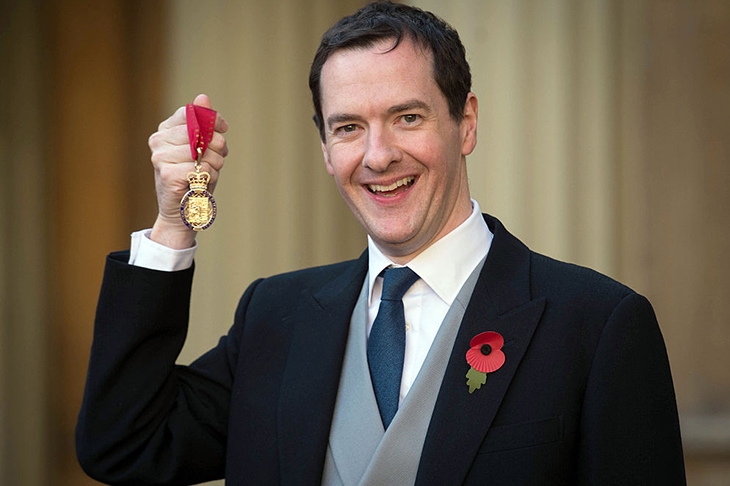So I am feeling a bit better about my lack of radio experience. These are exciting times for free movement of labour and with Westminster under the control of Tory and Labour cabals, lovely jobs outside Parliament are tempting. George Osborne is no more qualified to edit the London Evening Standard than Tristram Hunt to run the V&A, but now art and antiquities scholars have dried their tears, that is turning out splendidly. The late Nick Tomalin pointed out that success in journalism requires only ‘ratlike cunning, a plausible manner, and a little literary ability’. The trade is temperament as much as technical skill and Osborne has a journalistic love of mischief-making. When I introduced him to the newsroom last Friday, I thanked him for livening up our day. As the email about his appointment flashed up on journalists’ screens there was a murmur of ‘What?’ that grew to a chorus of astonishment. It was a far greater shock to Downing Street.
It is moving to see newsprint suddenly revered again, but those of us who can still do shorthand must face the fact that the old skills are in flux. These days, citizen journalism is a virtue, and I don’t think newly famous Instagrammers pause to consider who, what, why, where and when. The premium now is ‘bearing witness’ and access to scoops. The new Evening Standard editor will be in a position to bring in some fantastic political and City stories. I am sure he will be bold enough to put them in the paper.
George Osborne’s appointment is viewed as representative of a new world order, but really it is reasserting an older tradition. Politics and journalism have long been intertwined, never more so than by a previous owner of the Standard, Lord Beaverbrook. He also controlled the Express — the biggest-selling paper in the world after the war — and understood more than anyone the press’s power. Evgeny Lebedev will enjoy a star editor who shares his fascination with power and influence. Mr Lebedev’s parties are celebrated and run late. Imagine what they will be like now. The good news is the working day at Northcliffe House starts so early that the new editor may as well go straight on.
A couple of years ago, I was invited to No. 11 by the then chancellor for a dinner to honour Robert Caro, biographer of Lyndon Johnson. Osborne greeted my husband by reminding him that he worked for him as a news intern at the Sunday Telegraph. My husband asked Osborne what had happened to him in the intervening years. Osborne had had a sticky week after the Lords had taken him on over tax credits. I remember him questioning Caro with intense concentration over alternative routes to political victory when conventional ones are blocked. He learned the lessons well. Between Lyndon Johnson and Boris Johnson, he has role models for asymmetric political warfare. Disasters are temporary setbacks to future successes. The important thing is to be in play. And if Tatton disappears in the boundary changes, all the simpler.
Osborne has been a good friend to London. He sees the point of infrastructure and I hope he’ll fight hard for Crossrail 2, which has been shunted into the sidings by this government. London business rates are a huge issue, close to Osborne’s heart. He’s a supporter of the arts, with a streak of romanticism missing in David Cameron and Theresa May. It’s good news for Sir Simon Rattle’s concert hall, and Thomas Heatherwick’s Garden Bridge. The mayor Sadiq Khan, who is more than a match for Osborne as a political strategist, will understand what they can jointly achieve as champions of an open, liberal city. The Prime Minister is anxious to move attention away from London, so as to re-balance the rest of the country. The Osborne-Khan combination restores London as a major fighting force and possibly a city state. Both men have political outlooks at odds with the leaders of their parties. Both men would like to be leaders of their parties.
The caravan moves on. I must soon bid farewell to colleagues at the paper I have loved for joyful possibilities as the editor of the Today programme. The intelligence and decency of those I’ve met so far at the BBC make me impatient to begin. It will be liberating to start thinking nationally. How can we recreate the ability of our great cities to challenge London? Germany, where concert halls are springing up across the country, shows how culture can create municipal pride. At a Radio 3 event last week, my new colleagues from Manchester and Glasgow extolled their cities’ musical excellence. Glasgow is particularly well off for orchestras. Shall we demonstrate our love for Scotland by nominating Glasgow as our second city?






Comments